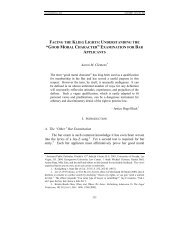The Science and Statistics Behind Spanking Suggests that
The Science and Statistics Behind Spanking Suggests that
The Science and Statistics Behind Spanking Suggests that
Create successful ePaper yourself
Turn your PDF publications into a flip-book with our unique Google optimized e-Paper software.
11-FULLER_FINAL_AFTERPROOF.DOC 2/17/2009 8:50 AM<br />
2009] THE SCIENCE AND STATISTICS BEHIND SPANKING 251<br />
professionals have imposed on mothers <strong>and</strong> fathers. . . . We didn’t<br />
realize, until it was too late, how our know-it-all attitude was<br />
undermining the self-assurance of parents.<br />
. . . And because this is a forward-looking, innovative country, there<br />
has always been less respect for the wisdom of the older generation. 28<br />
Nevertheless, childrearing professionals in the 1970s <strong>and</strong> 80s began<br />
using their influence to press an intensely child-centered view of the<br />
family—swinging the pendulum from the detached view of the 1920s to<br />
virtually the opposite extreme. 29 One of the more popular child-centered<br />
books, Thomas Gordon’s Parent Effectiveness Training, said parents<br />
should treat children like “a friend or a spouse.” 30 Such authors thought<br />
spanking may promote aggression, <strong>and</strong> a few now are trying to stop all<br />
punishments, even mental punishments like timeout. 31<br />
Today, the most influential spanking opponent is probably Dr.<br />
Murray Straus of the University of New Hampshire. 32 Dr. Straus thinks<br />
physical discipline can doom children to “major, <strong>and</strong> often life-long,<br />
social psychological problems,” like crime <strong>and</strong> mental illness. 33 While<br />
28. Spock, Bratty Child, supra note 25, at 31.<br />
29. See, e.g., id.; Rosellini, supra note 27 (revealing <strong>that</strong> psychologists <strong>and</strong> childdevelopment<br />
authorities during the 1970s <strong>and</strong> 80s advocated “a new, child-centered view of family.<br />
<strong>The</strong> locus of power should shift, these experts seemed to suggest, so <strong>that</strong> kids are equal members of<br />
the household.”); see, e.g., WATSON, supra note 26 <strong>and</strong> accompanying text.<br />
30. See, e.g., Rosellini, supra note 27 (saying Thomas Gordon’s 1970 best-seller, Parent<br />
Effectiveness Training, advised parents to stop punishing kids <strong>and</strong> to start treating them “much as<br />
we treat a friend or a spouse”).<br />
31. See, e.g., id. (reporting <strong>that</strong> many writers during the 1970s <strong>and</strong> 80s warned <strong>that</strong> strict<br />
parenting, <strong>and</strong> particularly punishments like spanking, could promote aggression <strong>and</strong> discourage<br />
children from cooperating with others) (“More recently, writers like Nancy Samalin <strong>and</strong> Barbara<br />
Coloroso counseled an end to punishment altogether.”).<br />
32. See, e.g., id. (reporting <strong>that</strong> Dr. Straus’ Beating the Devil Out of <strong>The</strong>m “seemed to solidify<br />
the antispanking consensus”); MARY ANN LAMANNA & AGNES RIEDMANN, MARRIAGES &<br />
FAMILIES: MAKING CHOICES IN A DIVERSE SOCIETY 314 (2005) (“A leading domestic violence<br />
researcher, sociologist Murray Straus (1996, 1999a), advises parents never to hit children of any age<br />
under any circumstances.”). Dr. Straus is “Professor of Sociology <strong>and</strong> founder <strong>and</strong> Co-Director of<br />
the Family Research Laboratory, University of New Hampshire (since 1968).” Dr. Straus’<br />
Biographical Summary, available at http://pubpages.unh.edu/~mas2/bio-sum.pdf. He “[p]reviously<br />
taught at the Universities of Minnesota, Cornell, Wisconsin, Washington State, York (Engl<strong>and</strong>)<br />
Bombay (India), <strong>and</strong> the University of Ceylon (now Sri Lanka).” Id. He is a recipient of the Ernest<br />
W. Burgess Award of the National Council of Family Relations (1977), the Distinguished<br />
Contribution Award, New Hampshire Psychological Society (1992), <strong>and</strong> the Research Career<br />
Achievement Award, American Professional Society on the Abuse of Children (1994). Id.<br />
33. See, e.g., Straus, Corporal Punishment, supra note 20, at 9 (saying his longitudinal<br />
research shows <strong>that</strong> spanking “is associated with an increased risk of the child experiencing major,<br />
<strong>and</strong> often life-long, social <strong>and</strong> psychological problems. . . . such as delinquency <strong>and</strong> adult crime,<br />
low educational attainment, physical assaults on spouses, <strong>and</strong> mental illness.”); id. at 53 (suggesting

















